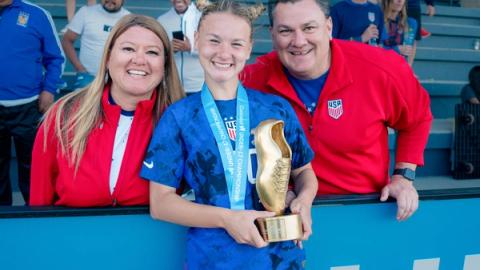Parents Who Are Getting It Right

One of the great things about our children playing youth soccer is the life lessons they learn along the way. Soccer affords our children an opportunity to make new friends and be held accountable to trying their hardest, all while layering in lessons in determination, dealing with setbacks, being a leader, the importance of teamwork, the value of practicing, and so much more. While these life lessons naturally materialize over the course of the season, in the work I am doing with Soccer Parenting, I have noticed some common practices from parents who are really getting it right when it comes taking advantage of the learning moments soccer so uniquely provides.
ENCOURAGING AUTONOMY
Parents who are getting it right understand the value and importance of their child having autonomy and encourage them to lead within the context of their soccer experience. A child who has autonomy feels like they responsible for making choices, and they don’t feel too much pressure or control from their parents.
Examples of this may be simple such as if they go to a sleepover on a night before a game or if they go outside and practice on their own, or more complex such as which level of soccer they choose to play, or leading when it comes to having difficult conversations with their coach. Children who have autonomy pack their own bag (if age appropriate), get their own water ready – and manage tasks related to their soccer experience such as making sure their soccer gear is clean and ready.
FAMILY STANDARDS
A second key quality of parents who are getting it right is that they have family standards when it comes to their child’s behavior during practices and games. Having these standards in place make the parent-child interactions around the soccer experience both empowering for the child and autonomy driven.
For example, instead of lecturing your child after practice about the need to always Try Hard, if you’ve done the legwork ahead of time, talked about what behaviors are associated with Trying Hard and agreed to them as a family standard - then you can just check in with your child instead of lecturing them!
Imagine a post practice conversation that flows like this:
“On a scale of 1-10 how do you think you did today in terms of Trying Hard?”
Your child chimes in with their score, and then you follow up with a:
“Tell me why you scored yourself that way.”
That type of post practice conversation is a powerful way for them to learn and grow.
Here are some examples of what I’ve seen over the years from families when it comes to Family Standards:
- Always thank the coaches after practice and games.
- Always thank the referees.
- Help with equipment when there is a need.
- Be a good teammate.
- Be curious: Ask questions when you are not sure.
- Demonstrate respect to the adults by paying attention.
- Try hard.
Conclusion:
By giving your child autonomy over the soccer experience, discussing Family Standards ahead of time, and then following up periodically on these standards during the season - you are setting your child up to make the most of their soccer experience. You will be a parent getting it right, helping your child learn important life lessons as they fall in love with the game and become a fan for life.




